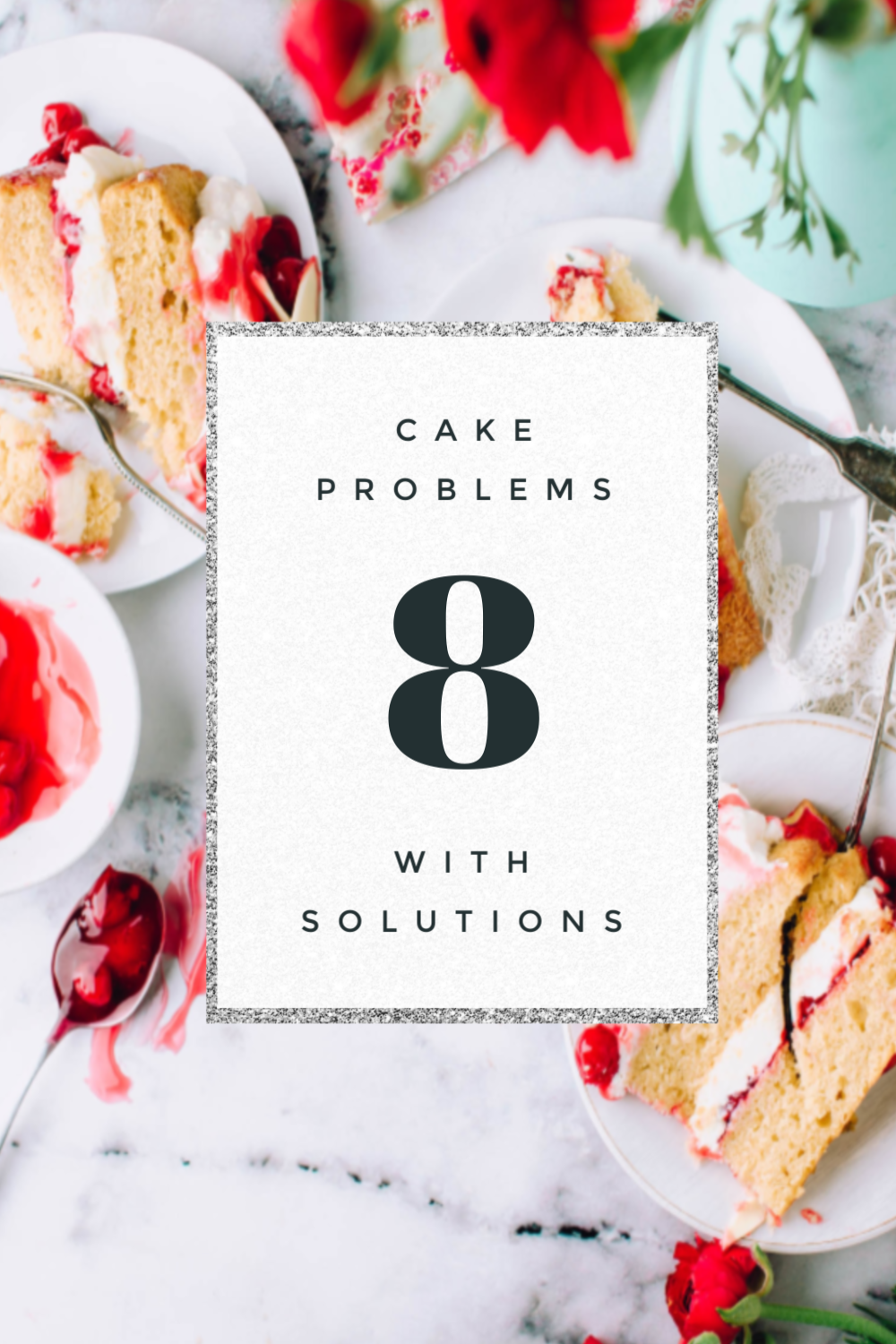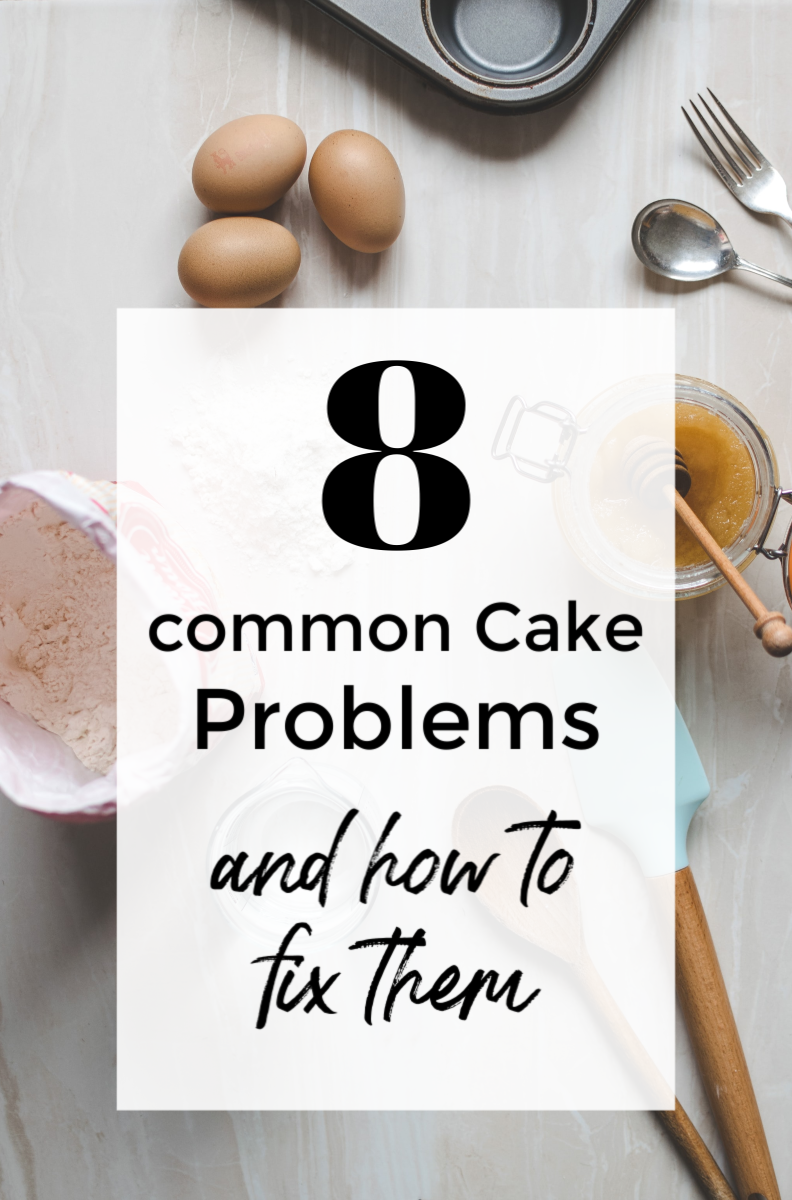BAKING CAKES: PROBLEMS AND TIPS
This post may contain affiliate links that won’t change your price but will share some commission.
Baking Cakes: Problems and Tips, this post is about common cake-baking problems and why they happen. You’ll get some helpful cake troubleshooting tips and easy ways to keep those cake-baking fails from happening.
With these cake-baking tips, you’ll know how to avoid all the pitfalls that bakers face.

Baking Cakes: Problems and Tips
Why is my cake not cooked in the middle?
If your cake is not cooked in the middle, the cake may not be fully cooked through.
If faced with this problem, reduce the heat of your oven and cover the top of the baking pan with foil if necessary.
However, three other things could be causing this problem;
- The temperature of your oven. If the temperature of your oven is too high, your cake will not cook properly. While the outside of your cake will be done and may even start to burn, the middle will remain liquid. Once you turn this cake out of the oven, the center may sink, or the uncooked batter may spill out when you cut the cake. This situation may be ideal for a molten chocolate cake, but it not suitable for a classic sponge or
butter cake. If the heat of your oven is too high, try baking at 325–350 degrees F. - The recipe does not contain a sufficient amount of flour. If the recipe does not have enough flour in it, it could take a while for the cake to bake thoroughly. If you take the cake out early, you will notice that the middle of the cake is wet.
- You may have over mixed your cake batter. If you over mixed your cake batter, the cake would rise very high in the oven. When you test for doneness, the cake may look a little wet or doughy. After you take the cake out of the oven, it will collapse, and the entire cake may look like poorly cooked dough.
I suggest that you try your recipe again and bake at a lower temperature this time.
What can I do when my cakes shrink and falls after baking?
I agree that if this happens after you remove the cake from the oven, it’s most likely it wasn’t “set” when you took it out. Cake texture is based on finding the magic balance between cooking the cake slowly enough to allow the bubbles from carbon dioxide to develop in the batter but fast enough to turn them into a solid before they collapse.
If you remove a cake a little early, the batter is still in a semi-liquid state, and removing it from the oven will result in the batter bubbles collapsing as it cools as carbon dioxide is just like any other gas – it expands when heated and contracts when cooling.
I agree with the toothpick test. Insert one in the thickest part of the cake. If there is ANY batter on it, leave it for 2–3 minutes and try again. The toothpick must come out as clean as it went in, with nothing sticking.
Remember that baking temperature & time are critical:
- Never put a cake into an oven that hasn’t been pre-heated. The reaction to form CO2 must start as soon as possible after the cake goes in the oven, or the batter will start to set before the bubbles develop.
- Always mix the cake batter as close as possible to when you put it in the oven. If you leave it on the counter, some of the baking powder will react and create CO2 that will just leak out of the batter before it goes into the oven, leaving less to develop when it does go in the oven.
- Oven temperature is critical. Too low, and it won’t solidify, and the CO2 will just leak out of the batter. If it is too high, it will solidify before the CO2 bubbles develop.
- DO – NOT – OPEN – THE – DOOR. You can open the door to check out a roast because temperature isn’t critical to cooking. If you open the door, the oven will cool down enough to affect the cooking temperature, which can lead to collapse. Don’t even think about opening the door until the cooking time has approached its minimum. Even then, give it a minute.
- Try to keep it quiet near the oven. Vibrations affect how CO2 bubbles develop in the batter. This is not the time to do some impromptu clog dancing or allow the kids to practice their body slams.
You have to calibrate your oven so that it’s reading the correct temperature.
As well, carefully read and measure your leavening agents.
If cake peaks in the center:
- Oven too hot at the start of baking
- Too much flour
- Not enough liquid
Your cake sticks to the pan
- Cake cooled in the pan too long
- Pan not greased and floured properly
You can use parchment paper to line the pan which will help. Also, use solid vegetable shortening and granulated sugar or flour or Wilton cake release to coat the pan. The non-stick spray works ok for layer pans, but I don’t like it for pound cakes.
For layer cakes, cool them in the pan for 10 minutes before turning them out. For pound cakes, cool them for 20 to 30 minutes before turning them out. (Pound cakes are so dense it takes longer to cool. If you turn them out too soon they can break.)
Cake cracks and falls apart:
- Removed from the pan too soon
- Too much shortening, leavening, or sugar
Crust is sticky:
- Insufficient baking
- Oven not hot enough
- Too much sugar
If the texture is heavy (dense) or ‘gummy’:
- Overmixing when flour and liquid added
- Oven temperature too low
- Too much shortening, sugar, or liquid
- The ingredients weren’t at room temperature
How to prevent it in the future
- Properly measure your flour by fluffing it, then spooning and leveling each cup.
- Mix your batter just until the ingredients are incorporated after you’ve added the flour. Over-mixing causes gluten strands to form giving your cake that dense texture.
- Cold ingredients are more difficult to mix together causing you to overmix the batter. They also affect your cake rising.
If the texture is coarse:
- Inadequate mixing or creaming
- Oven temperature too low
- Too much leavening
If the texture is dry:
- Over baking
- Over-beaten egg whites
- To much flour or leavening
- Not enough shortening or sugar
How to prevent a dry cake – Cakes keep baking for a few minutes after you remove them from the oven. If the toothpick comes out clean, your cake may already be overbaked. Next time take your cake layers out a few minutes earlier even if the pick has a few moist crumbs. Make detailed notes on time, temperature, and what pan you used for next time.
Baking Cakes: Problems and Tips
Measure accurately. Extra sugar or leavening causes a cake to fall; extra flour makes it dry.
Have ingredients at room temperature for maximum volume.
Beat softened
Use name-brand ingredients. Store brands of sugar are often more finely ground than name brands resulting in more sugar per cup. This can cause a cake to fall. Store brands of
Add eggs 1 at a time, beating the batter just until the yellow yolk disappears.
Always add dry ingredients alternately with the liquid to prevent the batter from curdling. Begin and end with dry ingredients. Mix until just blended after each addition. Over-mixing will result in a tough, rubbery cake.
Always use the correct type of cake pan. For instance, a Bundt pan and a

More Tips for Baking Cakes: Problems and Tips
Grease cake pans with solid vegetable shortening and dust with flour or sugar. A non-stick spray is often too slippery. A slippery surface keeps the batter from rising to its full volume.
Calibrate your oven to check for temperature accuracy.
Bake cakes in the center of the oven and keep the door closed. Check the cake at the minimum time suggested if more cooking time is needed gently close the door as quickly as possible after testing.
Fill cake pans 2/3 full and spread batter into corners and sides, leaving a slight hollow in the center.
To prevent domes in the center of your cake, use Even-bake strips.
The cake is done when it shrinks from the sides of the pan or if it springs back when touched lightly with the finger.
After removing a cake from the oven, place it on a rack for about five minutes for layer cakes, and 15 to 20 for pound cakes. Then, the sides would be loosened and the cake turned out on a rack in order to finish cooling.
Do not frost cakes until thoroughly cool.
Icing will remain where you put it if you sprinkle cake with powdered sugar first.

Hi,
Apologies if this has been asked and answered, but I am curious. Some pound cake recipes call for a 350 degree oven with 70 or so minutes for baking. Others call for a 325 degree oven with more time for baking. Which is better or is there a difference? Thanks!
I honestly can’t tell a difference in taste or texture. Sometimes I’m just in a hurry and bake them at 350 but most of the time I bake at 325
So this is the first time using this recipe and I had a couple of problems. I ordered a tube pan and used for the first time and the cake is very dry and dark brown sides and bottom, almost burnt. The cake has a good flavor, just very dry. I followed the directions to a tee but I think the temperature suggested is too high. I know ovens and bake ware vary so I’m going to try it again with a lower temperature. And I also lowered my oven rack to be in the center of the oven, which I didn’t see this mentioned in this recipe.
https://www.callmepmc.com/how-to-calibrate-your-oven/
I will try this method and see how it turns out… my first try was gooey in the middle and the edges burned .. what temp should the stove be set ? I added lemon juice and extract .. I will try this more simple way to get the hang of it .. I’m new to baking but determined to perfect my craft
Paula,
Which name brands of all purpose flour, sugar and butter work best for the million dollar fund cake ?
Flour: I like this https://amzn.to/2XRY0gG or https://amzn.to/2qGJrRi. (I like all King Arthur products.)
Sugar: I use any brand, even generic.
Butter: I really like Land O Lakes butter in the stick
what is your opinion of using powdered BUTTERMILK in recipes instead of fresh.
I haven’t tested powdered buttermilk in cakes.
Saco Buttermilk Powder is great; been using it for decades. Use 4 Tbsp. per cup of liquid buttermilk in recipe. Add buttermilk powder with dry ingredients; add water with liquid. I store an opened package of the Saco buttermilk powder in a glass jar in the refrigerator; I find leaving it in their packaging it can dry out (can be re-powdered in food processor if necessary).
Noticed the Million Dollar Pound Cake recipe said to put batter in Bundt Pan; however the pix shows regular Tube Pan; will the Bundt Pan work as well?????
Only if it’s a large bundt pan, 12 cup. The 12 cup is 4 inches deep. A regular bundt is about 3 inches deep (and I think a 10-cup)
I am from the deep South so between Cobblers, Banana Pudding, Strawberry Shortcakes, and homemade Peach Ice Cream, Pound Cakes were, are a staple in our home. Next time try alternating eggs and flour ending with flour then add liquid and extract(s) . Also if you add 1/2 c more sugar you will get an even heavier, crispy crust on top…pound cake n coffee in morning, nothing better!!! Thank you for sharing,
Do you know how to make Carmel icing the kind that will crack if touched & use on pound cake. Also looking for a good peach pie recipe. My Mom & Aunt passed on and used to make for me. Never got the recipe. She made a hell of a cocunut cake with pinnaple jam between layers too. Thank you!